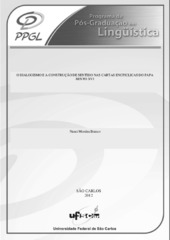| dc.contributor.author | Branco, Nanci Moreira | |
| dc.date.accessioned | 2016-06-02T20:25:15Z | |
| dc.date.available | 2012-11-16 | |
| dc.date.available | 2016-06-02T20:25:15Z | |
| dc.date.issued | 2012-03-27 | |
| dc.identifier.citation | BRANCO, Nanci Moreira. O dialogismo e a construção de sentido nas cartas encíclicas do papa Bento XVI. 2012. 173 f. Dissertação (Mestrado em Ciências Humanas) - Universidade Federal de São Carlos, São Carlos, 2012. | por |
| dc.identifier.uri | https://repositorio.ufscar.br/handle/ufscar/5749 | |
| dc.description.abstract | This study aims to analyze how the dialogical relationships and construction of meaning are built in current Catholic religious discourse, here represented by the encyclical letters of Pope Benedict XVI. I understand that even a discourse as established as the religious it is influenced by several others with which they share and to which they oppose ideas or use them to establish the meaning of the discourse. Thus, the dialogism and construction of meaning will be observed in the clash that occurs between the texts of the pope and the present discourses in society in different contexts, explicity and implicity referred to by the author, or even the discourses that are formed in different contexts in which these themes are inserted. So, the developed analysis will seek to understand, from the observation of dialogism in the documents in question, how to organize such discursive genre, and then establish, from the undeniable formation of extraverbal on the verbal, which is the relationship they have with these texts that circulate in society. I therefore consider that dialogical relations enable convergence or divergence, acceptance or refusal. In that way, one must do the question: what kind of opposing discourses should they keep deleted to preserve the hegemony of the official discourse? Which discourses are confronted with it? A discourse that intends to be dominant it tends to exclude others, not belonging to their universe that are not accepted or are discredited. The fundamental question of this analysis is therefore to understand the discourses of which we must defend and discourses to which we must resort to form the intended meaning in the encyclical letters in Authier Revuz (1990): that another one needs to defend, the other is needed to resort to be formed (p.31). Hence, this analysis seeks to verify how it happens, in the language, the confrontation of ideas which constitutes the discourse of this letter, analyzing how the voice of the Other is part of such discourse. The thought that will guide this research will be based on studies of the Russian philosopher Milkhail Bakhtin on Dialogism and Ideology. | eng |
| dc.description.sponsorship | Financiadora de Estudos e Projetos | |
| dc.format | application/pdf | por |
| dc.language | por | por |
| dc.publisher | Universidade Federal de São Carlos | por |
| dc.rights | Acesso Aberto | por |
| dc.subject | Análise do discurso | por |
| dc.subject | Discurso religioso | por |
| dc.subject | Bento XVI, Papa, 1927- | por |
| dc.subject | Dialogismo | por |
| dc.subject | Ideologia | por |
| dc.subject | Bakhtin, Mikhail Mikhailovitch, 1895-1975 | por |
| dc.subject | Religious Discourse | eng |
| dc.subject | Benedict | eng |
| dc.subject | Dialogism | eng |
| dc.subject | Ideology | eng |
| dc.subject | Bakhtin | eng |
| dc.title | O dialogismo e a construção de sentido nas cartas encíclicas do papa Bento XVI | por |
| dc.type | Dissertação | por |
| dc.contributor.advisor1 | Miotello, Valdemir | |
| dc.contributor.advisor1Lattes | http://lattes.cnpq.br/9131819326282708 | por |
| dc.description.resumo | Este trabalho tem como objetivo analisar como se dão as relações dialógicas e a construção do sentido no discurso religioso católico atual, aqui representado pelas cartas encíclicas do papa Bento XVI. Entendo que mesmo um discurso tão consolidado como o religioso sofre influências de vários outros com os quais partilha e aos quais contrapõe idéias ou delas faz uso para estabelecer o sentido do seu discurso. Dessa forma, o dialogismo e a construção de sentido serão observados no confronto que se dá entre os textos do papa e os discursos presentes na sociedade em diferentes contextos, referidos explícita e implicitamente pelo autor, ou, ainda, os discursos que se formam nos contextos diversos nos quais tais temas estão inseridos. Assim, a análise desenvolvida buscará compreender, a partir da observação da dialogia nos documentos em questão, como se organiza tal gênero discursivo, e depois estabelecer, a partir da constitutividade inegável do extraverbal sobre o verbal, qual a relação que tais textos têm com os que circulam na sociedade. Considero, para tanto, que as relações dialógicas podem ser de convergência ou divergência, de aceitação ou recusa. Assim, cabe questionar: que discursos opostos devem ser mantidos apagados para a preservação da hegemonia do discurso oficial? Que discursos o confrontam? Um discurso que se pretende dominante tende a excluir outros que não pertençam ao seu universo que não são aceitos ou são desprestigiados. A questão fundamental desta análise é, portanto, entender os discursos dos quais é preciso se defender e os discursos aos quais é preciso recorrer para constituir o sentido pretendido nas cartas encíclicas em Authier-Revuz (1990): de que outro é preciso se defender, a que outros é preciso recorrer para se constituir (p.31). Assim, esta análise busca verificar como se dá, na linguagem, o confronto de idéias que constitui o discurso desta carta, analisando como a voz do Outro entra em tal discurso. O pensamento que norteará esta pesquisa será os estudos do filósofo russo Mikhail Bakhtin sobre Dialogismo e Ideologia. | por |
| dc.publisher.country | BR | por |
| dc.publisher.initials | UFSCar | por |
| dc.publisher.program | Programa de Pós-Graduação em Linguística - PPGL | por |
| dc.subject.cnpq | LINGUISTICA, LETRAS E ARTES::LINGUISTICA | por |
| dc.contributor.authorlattes | http://lattes.cnpq.br/8778865168706085 | por |
